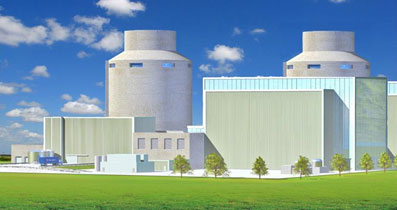Recent agreements could see up to 80% of work on British Westinghouse AP1000 units carried out by domestic firms. Meanwhile, the UK government has launched a manufacturing strategy naming nuclear as a priority.
 |
| How two AP1000s could look |
Westinghouse said the agreements expressed its company policy of "buy where we build" and that the deals could could result in "between 70 and 80%" of the work and services required for AP1000 construction being provided by the UK supply chain.
Collectively the agreements cover the design, fabrication and integration of modules; the erection and assembly of components; nuclear component manufacturing; safety and technical support and support for commissioning.
This approach is similar to that being taken in China, where work is already under way on the first two of four AP1000 units. An AP1000 module factory already exists in China while one is planned for the USA too.
Aris Candris, Westinghouse president and CEO, said that "these partnerships are a vital component in our ambition to bring the AP1000 reactor to the UK as part of the government drive to have new nuclear capacity installed as soon as possible."
"We are delighted to ... be the first to put in place arrangements with major players in the UK supply chain. We expect to expand our involvement with other UK supply chain companies as this work progresses." The company noted the recent addition of the UK's Sheffield Forgemasters to its supply chain. The company is making coolant pump casings.
Nuclear manufacturing strategy
On 8 September the UK business and enterprise department launched a new strategy for the manufacturing sector which it titled New Challenges, New Opportunities. The only opportunities it focused on concerned low-carbon energy, with nuclear taking top spot above renewables.
Comprising about £150 million ($260 million) government support, the strategy should help businesses put the UK "at the forefront of opportunities opened up by the move to a low-carbon economy," in minister John Hutton's words. "With the right support in place, we can grow our nuclear and renewables industries to become world-leaders in green technologies, supporting hundreds of thousands of 'green collar' jobs."
Next year, the government announced, a 'low carbon industrial strategy' would emerge. The nuclear component of this would be produced by the new Office of Nuclear Development with the aim of developing the nuclear supply chain ahead of what the government said would amount to £20 billion ($35 billion) in capital expenditure on new nuclear power capacity for the UK.
"Clarity on how government and industry can work together to create a globally competitive supply chain is extremely important," said Keith Parker, chief executive of the UK's Nuclear Industry Association. "Working closely with government is key in ensuring the UK is at the hub of worldwide nuclear development."







_94566.jpeg)






